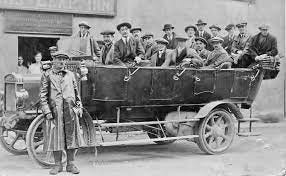When I first started my career with Elf Aquitaine in the early 1990s a colleague had just returned from an expat posting in Gabon. Three to four year postings in the affiliate companies, mostly in Africa, was common place. What was unusual was that he had come back overland with a couple of friends on their motorbikes. From the equatorial tropics of Gabon via the Sahel and the Ténéré desert back to Pau nestled in the foothills of the French Pyrenees. Why? Simply because they felt that the world had become too small when you could simply get on a jet, and a few hours later be pretty much anywhere. Travel had lost any sense of scale or wonder (or hardship).
The transition back to life in France could be lived by experiencing the physical distance.
Big World, Small Experience
In Cider with Rosie by Laurie Lee - a book I often refer to when writing about modern energy and society - the village Laurie Lee grew up in Gloucestershire on the Welsh borders is the center of his, and his family’s world. Their lives are limited to “the valley” with occasional trips to the local market town. A “once in a lifetime” visit to the seaside by charabanc was the travel event that marked the coming of the age of mass travel, as British society was transformed by the advent of trains, busses, cars and eventually cheap air travel. Cider with Rosie is set in the years just after WW1 - so almost exactly 100 years ago; a world my grand-parents would have recognized. A world that would be completely alien to most 21st Century Brits.
From the view point of the individual, one could argue that their world was very small: limited to the village, the families who lived, loved and died generation after generation in the same valley. By the same token the world was enormous - crossing the Atlantic took many days, Asia and Australia were often one-way trips due to cost and time. Communications had been revolutionised in 1858 with the first transatlantic telegram - cutting the time for information exchange from weeks to minutes - but for people it needed the advent of jet engines and cheap jet fuel to really shrink the world. The world was at once both huge, and yet most people’s experience of it was limited to a tiny geography.
Small World, Big Experience
The dissonance one can experience thanks to international flights is not necessarily proportional to the distances involved, but to the contrast between the start and end-points. In the mid 1990s I was working in Angola, which was by then past the worst of its civil war (at least as far as the capital, Luanda was concerned - the war was brutal and raging in the interior), but was still very poor and the capital was swollen with millions escaping the war. Objectively it was quite safe (and very friendly) for expats, but still had a level of uncertainty - a friend was shot at when failing to stop when a traffic police flagged him down, another hit by a random bullet fired in a “safe” part of town - incredibly lucky to just get a graze. Ironically the latter happened the same weekend that I was breaching all-sorts of company regulations by flying to Lobito in the south. Lobito had been in the news due to a (recent) reported UNITA attack on a UK based demining (land-mine clearance) NGO truck and a less recent shooting down of a UN plane. We went anyway and experienced a standard corkscrew (and very fast) descent into the airport - designed to make being shot at harder… The NGO truck was indeed blown-up, but more likely by the mines they had cleared than by any UNITA activity. The weekend passed with zero incidents
A couple of times a year I would fly out for vacation - to France, sometimes to New Zealand where my sister was living at the time. The airport was never fun - but the feeling of relaxation as the plane took off was always palpable; a reminder of the stress one was carrying unnoticed on a daily basis. Landing in Paris or Auckland and the dissonance hit - people walking around with no cares about safety, with rules being obeyed, shops, restaurants, and stuff just “working” - it was almost as if this was the unreal dream-state, with the normality of life and its hardships being in Angola (to be clear, the hardships were not mine, but what I witnessed there).
I can only imagine what it must be like for anyone who has served in conflict zones and then come back to “normal” life - maybe only a few hours in a plane separating these alien worlds. Or for refugees who manage to find a way to make the journey.
Big World, Small World
The opening of international travel to the masses is a result of technology, scale and of course cheap fuel. Suddenly the world “shrank” - and hard to imagine now, but it used to be possible to fly Concord and arrive in New York before you left London (OK, it wasn’t time-travel as such, but the 3.5hr flight time was less than the time-zone difference). Even without Concord and supersonic flight - travel to far-flung places is affordable for many - and whilst people from many countries are quite familiar with this - it is a novelty, or out of reach, for many people in developing countries. Indeed an increase in flights is one indication of development - "The skyrocketing domestic passenger traffic post Covid is a reflection of India's high growth," aviation minister Jyotiraditya Scindia tweeted. BBC.
Whilst flying - especially short distance trips - has become increasingly frowned-upon the same applies to all forms of travel - cars have provided unimaginable freedom to roam and rail-networks when properly designed and managed - provide an acceptable (and often very pleasant) alternative. It is no surprise that China has placed a lot of emphasis on its high-speed rail network. From a standing-start in 2008, China had built some 20,000km of high-speed lines - according to The Economist this was already more than the rest of the world combined. The current estimate is 42,000km built, and an expectation of reaching 70,000km by 2035 (CNN). Clearly, the ability to build such huge distances of rail is a function of technology and finance - but also of China’s political system. Indeed, huge infrastructure projects often have a dual purpose - the infrastructure itself but also jobs and GDP.
The United States has just 375 miles of track cleared for operation at more than 100 mph (160km/hr).
Outside of personal travel, the same effects have changed the nature of international trade - with cheap shipping and air-freight allowing for foods from all corners of the world being found in super-markets whatever the season.
Not exactly “exotic”, pasta is now commonplace. Imagine thinking that spaghetti grows on tress, and that the famous thin strands could suffer from good or bad harvests? This was exactly the thesis of the famous 1957 April Fool’s prank broadcast by the BBC’s Panorama program. Globalization has put paid to this.
Honey, you shrunk my world!
The world in all its vastness is now familiar in so many ways and not just for Europeans and Americans. The world is not big or small; it just is, but the way in which we experience it changes our perception of scale. Imagine the enormous energy surplus a society must have such that people can chase a storm across the vastness of the Pacific, just to surf waves for fun (a noble calling for sure, but not exactly productive for society as a whole).
As energy costs rise, so travel and trade will become less affordable; we can expect fewer exotic goods in stores and a lot less personal travel. Driving will become a luxury again as will flying, if it isn’t banned first. If you dream of space travel, well, keep dreaming. Expensive travel could be a hugely damaging for Net-Zero Europe, as it transitions itself into a living museum, bereft of industry but keen to welcome ever more tourists from Not-Zero countries.
Joking aside, there is a very real possibility that the boundary of how we experience the world will start to close in, and we will wonder what is “out there”. On the further side of that event-horizon, the big, bad world with all its wonders and exoticism will start to recede into the distance as we regress to the valleys of our ancestors.
This will follow the dictum of “gradually, then suddenly” - the cost of living crisis is already showing up in the data on travel. Clearly, less transport will be welcomed by many - but shrinking opportunities are an indicator of what energy rationing portends.
Your world will be getting smaller - but in an attempt to stay positive, it should open up new possibilities for good April Fools pranks.
PS - guesses on the relevance of the Anime image in the comments please :-)






Great. I hold the exact same views.